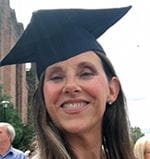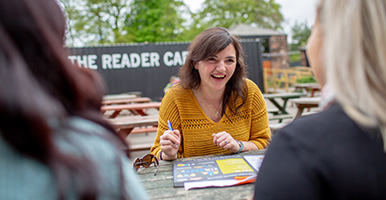Postgraduate study in English
What it's like to study at postgraduate level
The English department run two Masters programmes: MA English Literature and MRes English. Students are part of the same postgraduate community and study research methods together in the first semester, but the MA offers a selection of modules to extend students’ reading in different periods and genres while the MRes supports students in their development of a research project throughout the year. See the prospectus pages for further details and application: MA English Literature and MRes English.
We asked former students to reflect on their experiences:
 Having completed my undergraduate degree in English Literature and Creative Writing at LJMU, graduating in 2019, it seemed a natural step to continue on to masters level. For me the MRes was a logical choice as it afforded continued research into the field of ‘creative histories’, an area of study I began to explore for undergraduate dissertation.
Having completed my undergraduate degree in English Literature and Creative Writing at LJMU, graduating in 2019, it seemed a natural step to continue on to masters level. For me the MRes was a logical choice as it afforded continued research into the field of ‘creative histories’, an area of study I began to explore for undergraduate dissertation.
I position my research in nineteenth-century crime and punishment with a particular interest in convict transportation to Australia. I am fascinated by material culture, specifically copper coins that were refashioned by convicts into love token and left behind as mementos. The focus of my research is to uncover ordinary lives or unheard voices from the past and reimagine their life-course from crime to punishment. To do this I trawl through a myriad of official records and piece together the fragments of documents, mostly found in digitised databases, and from here a life story emerges.
The research methods module equips the student with necessary tools to develop their own work and the project development module supports progress every step of the way. Throughout the academic year the student is fully supported by tutors and their dissertation supervisor.
For anyone wishing to take their research to the next level the professional development module encourages students to communicate their project outside of academia. After a session on presenting research I was inspired to submit an application to The Being Human festival 2020. Being Human is the UK’s only national festival of the humanities that aims to engage with non-specialist audiences through public engagement activities and events. My idea to organise a walking tour that follows the footsteps of a nineteenth-century criminal was accepted and presently with the help of LJMU I am in the process of organising. By making my research accessible in the public sphere I hope to share my enthusiasm for nineteenth-century artefacts and encourage others to discover and write about unheard voices from the past.
– Lindsay Wilkinson (current MRes student)
 The MRes is an intensive and focused course that, from the offset, sought to challenge me, refine my abilities and lay the foundations for my future career in research. The support and teaching I received from the faculty at LJMU helped my research project on late-Victorian Gothic to achieve its full potential and has continued to benefit my career since. With modules focusing on research methods and professional development, and tailored seminars and events on our fields, the MRes not only shaped my approach to research, but helped me to grow both personally and professionally. The course regularly encourages students to present their work, and the MRes showcase gave me the confidence to present at future conferences. The experience I gained from the course has since helped me to achieve my first academic publication, and further my career both in and out of academia.
The MRes is an intensive and focused course that, from the offset, sought to challenge me, refine my abilities and lay the foundations for my future career in research. The support and teaching I received from the faculty at LJMU helped my research project on late-Victorian Gothic to achieve its full potential and has continued to benefit my career since. With modules focusing on research methods and professional development, and tailored seminars and events on our fields, the MRes not only shaped my approach to research, but helped me to grow both personally and professionally. The course regularly encourages students to present their work, and the MRes showcase gave me the confidence to present at future conferences. The experience I gained from the course has since helped me to achieve my first academic publication, and further my career both in and out of academia.
– Andreas Theodorou (completed MRes 2017-18)
Completing an MA at John Moores was an incredibly rewarding journey, the student support and teaching methods created an ideal environment for academic progress and I would thoroughly recommend this engaging course.
– Sara Adio (completed MA 2018-19)
The English Literature MA at LJMU gave me the opportunity to read works of both contemporary and canonical fiction and philosophy that I would otherwise have been unlikely to encounter. Importantly, I would have been much less likely to realise fully their social significance, such as to the ongoing global refugee crisis, had I encountered these works independent of the course.
– Roger Williamson (current MA student)






